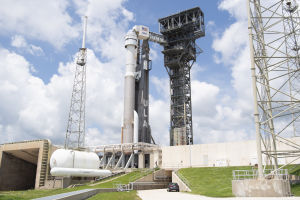Boeing scrubs its space capsule launch and blames the Russians

Otherworldly investors will have to wait a little longer for the next dramatic step in commercial space travel: Boeing had to push back Friday’s launch of Starliner, its reusable capsule developed with NASA.
But don’t blame the company, or the weather. Blame the Russians.
Everything was on track for the unmanned Starliner to lift off to the International Space Station when a Russian science module already at the ISS had a problem with its thrusters Thursday.
The thrusters accidentally fired while the module was connected to the ISS, shifting the station’s attitude—or intended position relative to its horizon. Now, the ISS astronauts need to make sure everything is shipshape before Starliner attempts to dock. The flight is now scheduled for Tuesday.
These days, NASA is using commercial companies to manage crew transport and cargo. Boeing’s Starliner can carry seven astronauts or a mix of passengers and supplies. Elon Musk’s SpaceX has already completed a couple of crew flights to the ISS.
To reach the station, SpaceX uses its own capsule and rockets. Boeing’s capsule rides atop a rocket designed and built by United Launch Alliance, or ULA, a joint venture of Boeing (ticker: BA) and Lockheed Martin (LMT).
All the commercial activity represents a new era for space. NASA has always contracted with companies for parts and equipment. Boeing, for instance, had a role in building the Saturn V rockets that took man to the moon. But the agency is taking a more hands-off approach today, letting companies manage chunks of the process.
Space is also being transformed by reusability, which is lowing costs to reach space. A couple of weeks ago, Virgin Galactic (SPCE) founder Richard Branson flew in the company’s reusable spaceship, and Amazon (AMZN) founder Jeff Bezos took ride in a reusable rocket developed by his Blue Origin.
Galactic and Blue Origin are starting space tourism business, but their launch capabilities aren’t yet comparable to SpaceX or ULA. Bezos, for instance, went up about 66 miles. The International Space Station is about 254 miles up.
Starliner’s delay isn’t hitting Boeing stock. Shares were down 1.2% in morning trading. The Dow Jones Industrial Average was down 0.3% and the Nasdaq Composite was off 0.6%.
Boeing stock rose 4.2% after posting a surprise profit on Wednesday. Better than expected profit margins in the company’s Defense, Space and Security segment were part of the reason for the quarterly surprise.
Boeing stock is up about 8% year to date, far behind gains of the S&P 500 and Dow Jones Industrial Average of 18% and 15%, respectively.
Al Root https://www.barrons.com/
